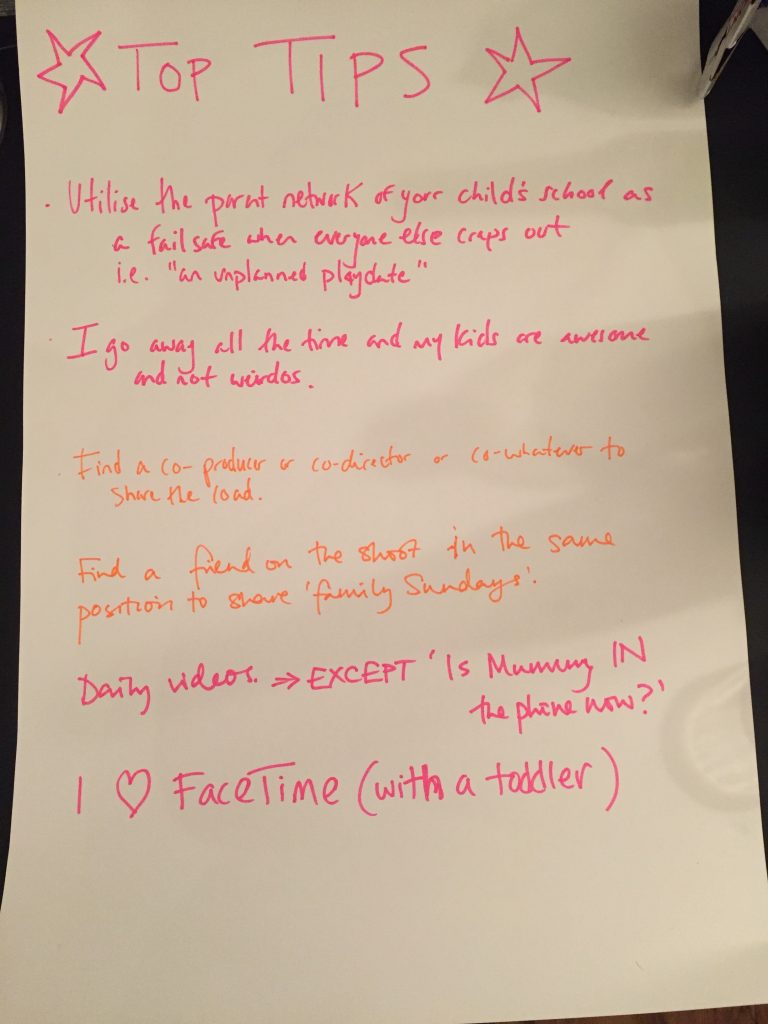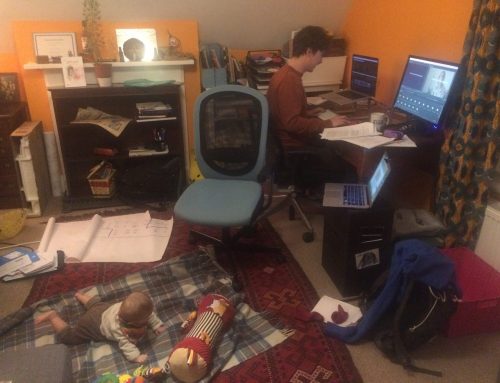This week we had our first informal Raising Films gathering, to discuss Shooting Away From Home. A room of parents gathered to share their experiences, or to find answers to questions that were worrying them. Some people were shooting away from home for the first time, some had done it before, but when their children were much younger, so they faced a whole new set of challenges.
It seemed that there were two sets of issues to tackle: emotional and logistical.
From the logistical point of view people talked about organising the time when they were away so that their children had family to visit them, or holiday camps booked in. They asked about whether anyone had ever timed a shoot to coincide with a child starting school (yes) and whether it was better to be there for the child in the run up to starting school, or for the first few weeks of school life. Some people fill up their freezer with portions of food so help those carers staying at home (but also because it makes them feel they’ve done something, and eases some anxiety today).
Were set visits a good or bad thing for the children (and parent)? Both. Lots of directors didn’t want to go home, despite missing it, but having some top-up emotional time with their family was important during long shoots. Some children hate seeing their parents on the set, and so they keep them away. Can costs incurred by this kind of travel be met by the production rather than the individual? Good question. It’s definitely worth asking your producer, financier, agent. If you don’t ask, you won’t get.

And of course there’s the complicated issue of childcare – how do you manage to find childcare that can fill in the awkward gaps to that normal set up that happen when a parent is away full time? Au Pairs are a great option, extended family visits, and nannies become incredibly useful. Several people’s partners took time off work to solo parent when they went away, incurring a financial blow to the household but easing up logistical and emotional issues both.
What can be done about the costs of childcare? Making it a line item in the budget is good, yes, but then who gets to access that pot of funds? What about the crew? It would be useful if there was a levy instead of a line item, so productions could apply to that for the funds for their crew, rather than taking it out of their own budgets. It would be great if people could buy childcare vouchers out of their pre-taxed earnings, just as they can in many other professions – what would it take to make that happen?
There seemed to be a consensus that the 6 day week or 11 day fortnight is a false economy. That crew are destroyed by it, physically and emotionally, and that means no-one does their best work, or returns home (where they often then have to immediately return to catch-up levels of parenting) able to do anything but recover for a fortnight.
So if we had five-day shoot weeks that would allow people to go home, if they wanted, or have their family visit, if they wanted, or at least catch up on the business of looking after themselves. The five-day week seems like a really important issue at the Raising Films table, and shows directly how logistical concerns very quickly become emotional ones. Similarly the idea of sharing your job – either literally as a job share, or by bringing on a co-producer or co-director for example – was raised as a way to ensure you could make sure the work was getting done, but without neglecting your family life entirely. 
Weekends on location can be fantastic – time to yourself without your kids! – but for some parents just highlighted the fact they were without their beloved families, and they felt sad not being present for their weekend routines and rituals. A suggestion for how to deal with this was to find another crew member in the same position, and make plans with them for the weekend. Do something that you love doing but never get to do with your kids. Don’t feel guilty about being away, noone benefits from that.
Emotionally we think it’s about our children, but we all admitted that our own emotional needs could not be neglected (again/anymore/forever). There were lots of fantastic tips for taking care of your child’s anxieties or distress about you going away – but it was also reassuring to hear from someone whose sister is a child psychologist that you child is fine as long as they know you are there-for-them. You don’t have to be physically there, they just have to know that you are there-for-them. This is an important distinction – it means you can focus your preparation into ensuring that they understand that you are going to work, and working is good, and that you are coming back.
So this means that in the time before you go away, you can ensure they understand why you are going away, and that you will be coming back. Perhaps you can book in a holiday for when you come back, or an activity like painting their bedroom. ‘We’ll do that when I get home’. Finding ways to be present while you are gone were also helpful – for them, and for you. Like recording your voice reading the stories in the MeBooks app. Or filling up the freezer, as above, or sending videos of yourself while you’re away, or sending pre-arranged postcards each week of the part of the world you are in. Walking away from your identity as a parent while you fulfil your identity as a filmmaker is hard – finding a way to smooth the transition both out of that and back in again after your return, is as important for you as it is for them.
With all the many tips people were sharing, we all agreed that talking about it felt good and important. It helped to feel that others were going through the same things, and that we were all going to make it work. It is as important to remember that, as someone said, ‘I go away all the time and my kids are fine and not weirdos!’ as it is to help them understand that you need something for yourself, and that you are not being selfish by continuing your career. Onwards to the next one.




